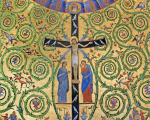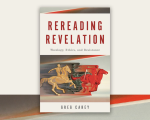Review: Contesting the Body of Christ
In this book, Baptist theologian Myles Werntz explores the landscape of twentieth-century ecclesiology and shows how the four marks of the church were remade, contested, and reaffirmed in surprising ways.
Review & Giveaway: The Seven Mountains Mandate
Beau Underwood reviews The Seven Mountains Mandate: Exposing the Dangerous Plan to Christianize America and Destroy Democracy, which Matthew Boedy wrote to alert those who were ignorant or complacent about what was going on and what was at stake.
Review: We Call Ourselves Disciples
Written by Christian Church (Disciples of Christ) pastors and scholars, this collection of essays explores the mainline Protestant denomination’s diverse history, theology, worship, and mission.
Review: Rooted in Faith and Justice
As the world’s attention is on the devastation of Gaza, this book offers a powerful and enlightening perspective through the eyes of Palestinian Christian leaders and thinkers.
Out in the World
With the weaponization of Scripture regularly making headline news, “The Bible According to Christian Nationalists” officially releases today to point to better ways of reading and applying sacred texts.
Review: The Bible According to Christian Nationalists
In this new book, Brian Kaylor exposes the ways Christian Nationalism distorts scripture through seven different problematic approaches to interpreting and applying the biblical text.
Review: Rereading Revelation
Greg Carey, scholar of the New Testament and apocalyptic literature, invites readers to reconsider the Book of Revelation as a text that can speak meaningfully to contemporary resistance movements.
Review & Giveaway: The Bible According to Christian Nationalists
How do we make sense of our confusing political moment? Scripture is constantly warped to advance purely partisan agendas. The underlying goal is advancing power at seemingly any cost. Luckily, we have a new book that deciphers it all.
Review: Hungry for Hope
In this timely book, young adults voice their concerns and laments about the church’s past and present, as well as their hopes and dreams for its future.
Review: Eating With Jesus
The latest book from Robert D. Cornwall laments how Christians have historically built ‘fences’ around the Eucharist and explores just how radical Jesus’s vision for table fellowship can be.










